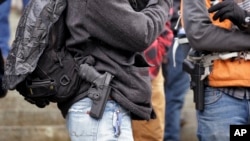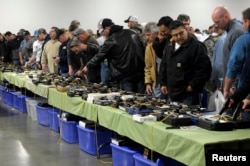Gunshots rang out once again on a campus in the United States on Wednesday.
Students and faculty raced out of harm's way, ducked under furniture, barricaded doors and hid in interior rooms, bathrooms and labs. The short-lived nightmare on the campus of the University of California, Los Angeles came one day before Wear Orange: National Gun Violence Awareness Day.
Wear Orange was inspired by friends of Hadiya Pendleton, a 15-year-old Chicago high school student killed by gunfire in 2013. The group decided to honor her life by wearing orange — the color worn by hunters in the woods to protect themselves and others.
While the idea has been embraced by civic organizations, politicians and celebrities, it has been rejected by gun rights advocates. The National Rifle Association has attacked the campaign as "pointless," and said "participating is an easy way of scoring points for being 'socially conscious.'"
Here is a look at the unique relationship between Americans and their guns.
Watch video report from VOA's Zlatica Hoke:
Second Amendment
Any law-abiding citizen in the United States is allowed to own or carry a gun.
That right comes from the U.S. Bill of Rights and the Second Amendment to the U.S. Constitution. It says: "A well-regulated militia, being necessary to the security of a free state, the right of the people to keep and bear arms, shall not be infringed."
The Second Amendment was based partially on English common law, which describes an auxiliary right, supporting the natural rights of self-defense, resistance to oppression, and the civic duty to act in concert in defense of the state.
Ease of ownership
To purchase a gun in the majority of states, a person needs to be of age, pass the FBI's National Instant Criminal Background Check and fill out a firearms transaction record.
However, background checks are not currently required for private sales, including those conducted at gun shows.
Certain people are banned from owning weapons, including convicted criminals, people with mental health illnesses or non-U.S. citizens. But the system has major holes in it.
Gun debate
Pro-gun ownership: The wording of the Second Amendment is the primary defense cited by gun rights advocates. They say Americans have a constitutional right to arm themselves.
Many supporters are quick to point out that stricter gun laws have not ended gun violence in cities such as Chicago and Washington, D.C. Gun owners say firearms give people the power of self-defense, dissuading criminals from victimizing people who might be armed. That argument appears to gather momentum with every report of a mass shooting.
Pro-gun control: Those advocating stricter laws cite statistics to bolster their case. The Centers for Disease Control and Prevention reports that in 2013, there were more than 33,000 firearms deaths in the U.S.
They point to countries like Japan where gun control laws are strict and shooting deaths are almost nonexistent. They argue that better records on gun ownership and more stringent laws dictating the sale, possession and storage of guns would allow law-abiding people to have firearms, while resulting in far fewer accidental deaths, suicides and homicides.
U.S. reality
The debate on guns has played out many times in American history. But regardless of where one falls, the fact remains that U.S. gun ownership is exceptionally high and growing. According to the Small Arms Survey, the United States has an average of 116 guns per 100 people, although most of those weapons are owned by a minority of citizens.
The United States is home to roughly 35 to 50 percent of the world's civilian-owned guns, even though it holds less than 5 percent of the world's population.







